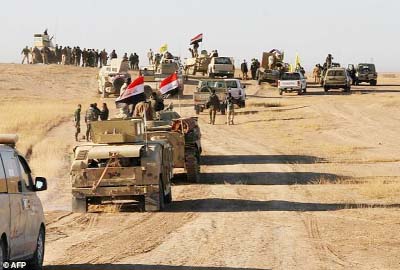
AFP, Mosul :
Barely a month after Baghdad declared victory over the Islamic State group, the jihadists could still recapture areas of Iraq, especially near the border with Syria, experts and officials say.
Ali al-Bayati, a commander of the Hashed al-Shaabi paramilitary units which fought alongside Iraqi security forces in a gruelling battle against the group, said the Nimrud region of northern Iraq could “fall at any time because security there is fragile”.
Last July, the authorities in Baghdad announced with much fanfare the “liberation” of nearby Mosul, Iraq’s second city.
IS fighters who fled their former stronghold and took refuge to the west, in the vast desert towards the Syrian border, have since launched attacks on security forces and civilians, Bayati said.
Hiding out in valleys and gullies as well as trenches dug before their ouster from Mosul, the jihadists have built up stockpiles of arms, fuel, water and food.
More than 4,000 jihadists have been arrested in Nineveh province since Mosul’s capture, according to police chief General Wathiq al-Hamdani.
But Aed al-Louayzi of Nineveh’s provincial council said several civilians have been robbed or killed inside the city itself, some by assailants disguised as soldiers.
He says the attacks have been the work of IS members from the areas of Tal Afar and Hatra, both towns also recaptured last year from the jihadists.
Hisham al-Hashemi, a specialist on jihadist movements, said Iraq’s announcement in December of military victory “simply means that the (black) IS flag is no longer flying” over government buildings.
To counter the threat of an IS resurgence, “several operations have been carried out south of Mosul” with US-led coalition support to seize arms, said coalition spokesman Colonel Ryan Dillon.
Louazi said that “geographically, the territory has been retaken… but not all the jihadists there have been arrested”.
“We are in the same security situation as that which led to the fall of Mosul” back in 2014, which came after the extremists had seized control of some areas, he said.
Barely a month after Baghdad declared victory over the Islamic State group, the jihadists could still recapture areas of Iraq, especially near the border with Syria, experts and officials say.
Ali al-Bayati, a commander of the Hashed al-Shaabi paramilitary units which fought alongside Iraqi security forces in a gruelling battle against the group, said the Nimrud region of northern Iraq could “fall at any time because security there is fragile”.
Last July, the authorities in Baghdad announced with much fanfare the “liberation” of nearby Mosul, Iraq’s second city.
IS fighters who fled their former stronghold and took refuge to the west, in the vast desert towards the Syrian border, have since launched attacks on security forces and civilians, Bayati said.
Hiding out in valleys and gullies as well as trenches dug before their ouster from Mosul, the jihadists have built up stockpiles of arms, fuel, water and food.
More than 4,000 jihadists have been arrested in Nineveh province since Mosul’s capture, according to police chief General Wathiq al-Hamdani.
But Aed al-Louayzi of Nineveh’s provincial council said several civilians have been robbed or killed inside the city itself, some by assailants disguised as soldiers.
He says the attacks have been the work of IS members from the areas of Tal Afar and Hatra, both towns also recaptured last year from the jihadists.
Hisham al-Hashemi, a specialist on jihadist movements, said Iraq’s announcement in December of military victory “simply means that the (black) IS flag is no longer flying” over government buildings.
To counter the threat of an IS resurgence, “several operations have been carried out south of Mosul” with US-led coalition support to seize arms, said coalition spokesman Colonel Ryan Dillon.
Louazi said that “geographically, the territory has been retaken… but not all the jihadists there have been arrested”.
“We are in the same security situation as that which led to the fall of Mosul” back in 2014, which came after the extremists had seized control of some areas, he said.

